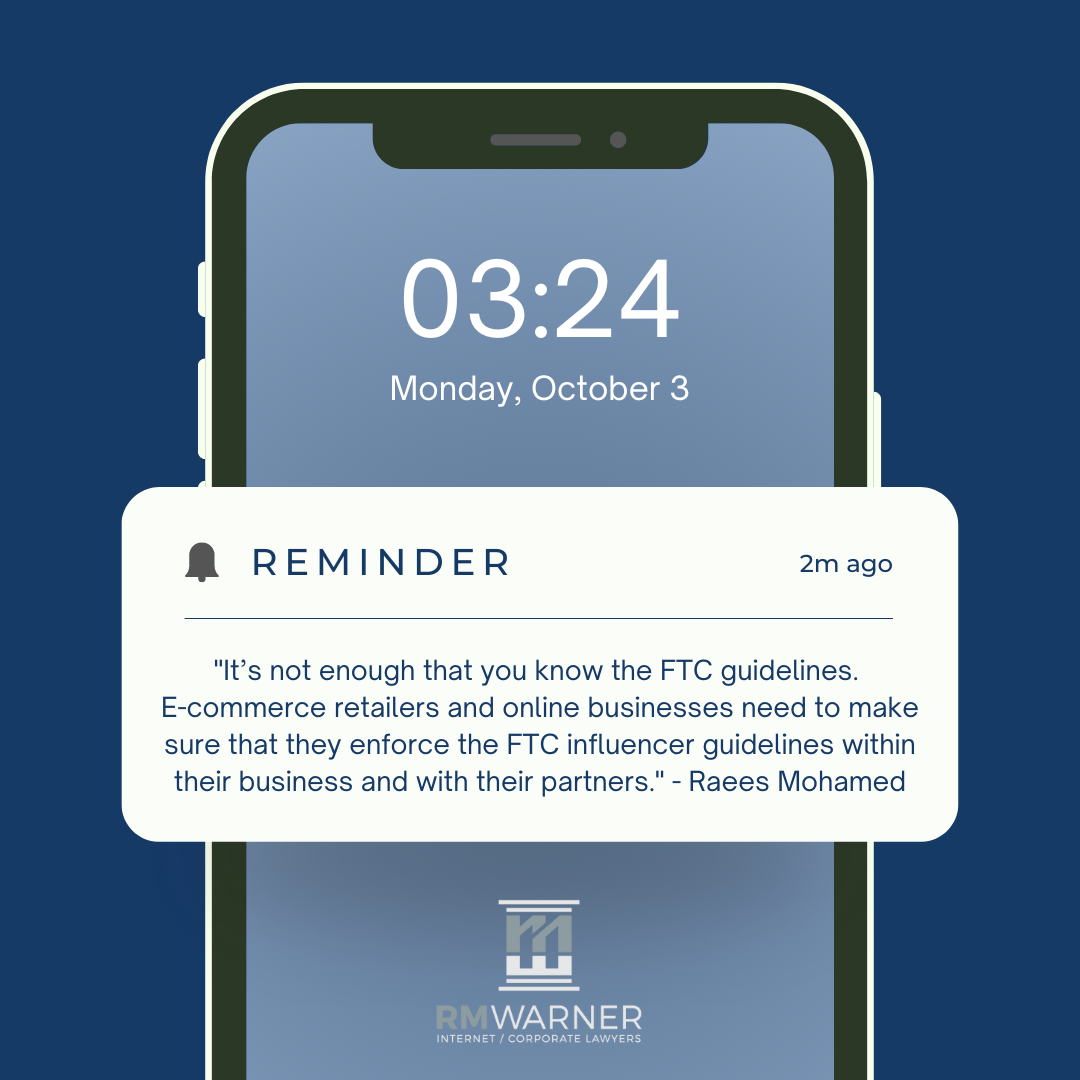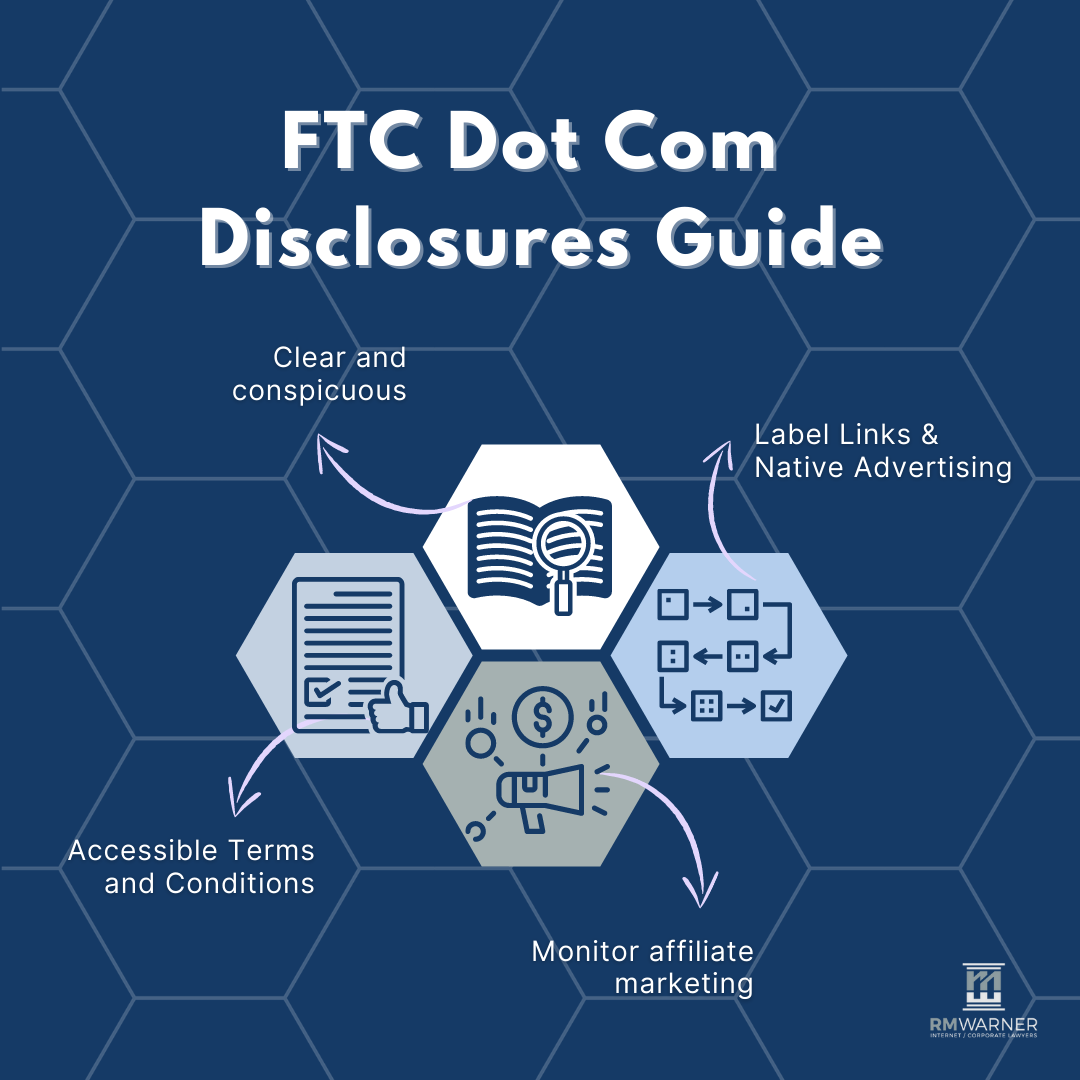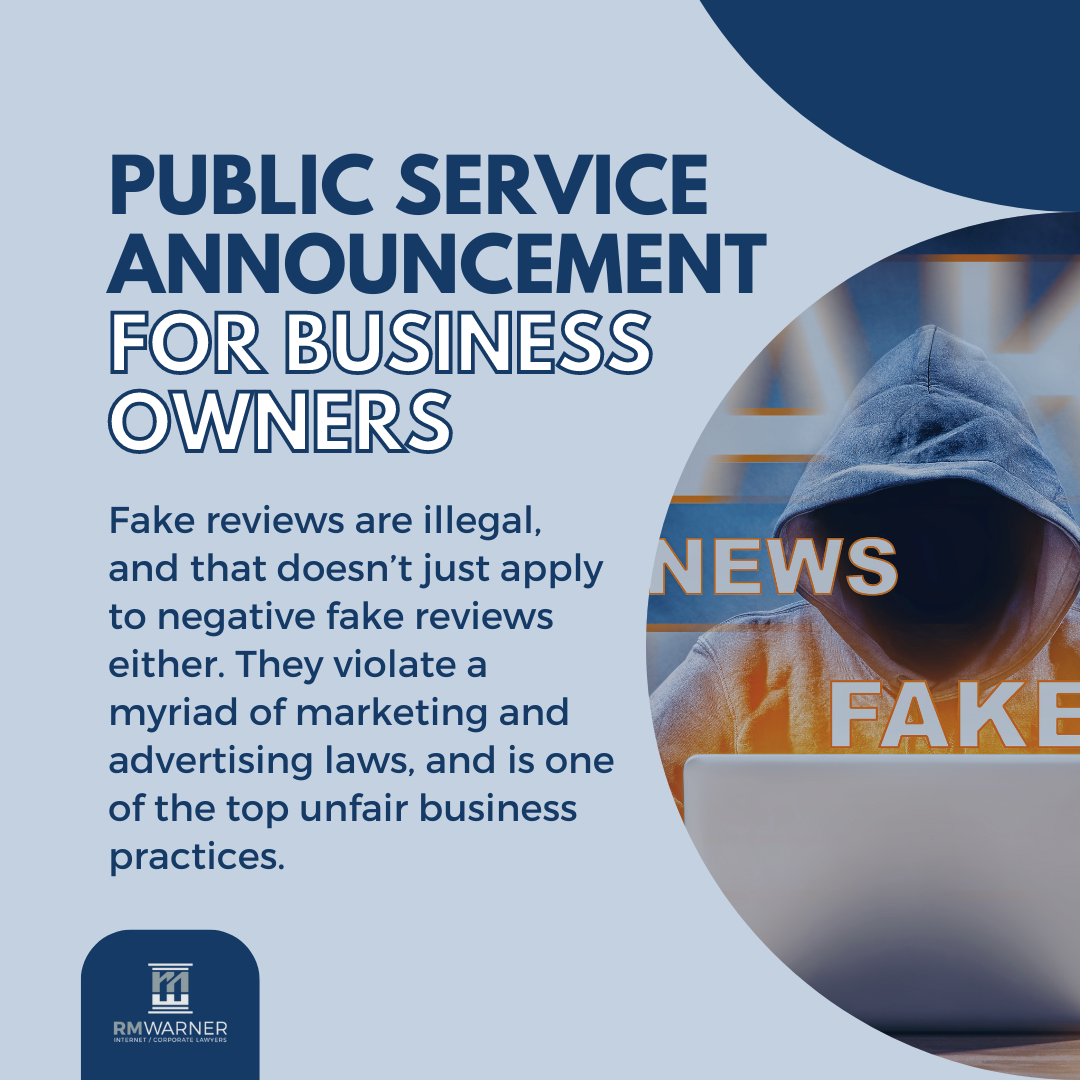Top Ten Things Marketers Need To Know About Fake Reviews
Top Ten Things Marketers Need To Know About Fake Reviews

Are you a marketing or public relations professional seeking to get a leg up on the competition? Sure, it’s very easy to “anonymously” post fake reviews slashing a competing brand, but is it really worth it? If you’re on the fence, consider these ten tips on online review legalities straight from Internet lawyers themselves.
#1: Are Fake Reviews Illegal?
Yes, 100%. Fake reviews, regardless of tone, violate a myriad of marketing and advertising laws. Here’s what the Federal Trade Commission, the United States government regulation of unfair business practices, has to say about them:
“[Endorsements] must reflect the honest opinions, findings, beliefs or experiences of the reviewer.”
It’s simple: are fake reviews considered “honest opinions, findings, beliefs of experiences of the reviewer”? We don’t think so.
Not to mention, if fake reviews are used in a commercial capacity, the FTC could charge you with violating Section 5 of the FTC Act. Fake reviews also violate the Lanham Act, so don’t think these types of violations come without punishment.
“If an endorser is acting on behalf of an advertiser, what she or he is saying is usually going to be commercial speech – and commercial speech violates the FTC Act if it’s deceptive. The FTC conducts investigations and brings cases involving endorsements under Section 5 of the FTC Act, which generally prohibits deceptive advertising.” – The FTC.
If you’ve been wondering, ‘can the FTC impose criminal sanctions?’ The answer would be yes, and anyone can file complaint. To learn how to identify fake reviews online, click here.
#2: Injunctions
It isn’t hard to imagine how fake reviews can hurt a business. Falsified reviews can ruin reputations, negatively affect revenue, and errode consumer trust. With so much at stake, companies plagued with malicious fake reviews should hire an attorney. A legal professional can help you obtain an injunction against the publisher.
#3: You Can’t Just Blame Your Affiliates
 What if, technically, your company didn’t post the fake review? You’re not responsible, right? Wrong. The FTC makes it clear that marketers and businesses are responsible for the actions of the affiliates. This means that if an affiliate- whether it be a store that sells your product or an influencer that endorses it- violates marketing regulations, your business can be held liable.
What if, technically, your company didn’t post the fake review? You’re not responsible, right? Wrong. The FTC makes it clear that marketers and businesses are responsible for the actions of the affiliates. This means that if an affiliate- whether it be a store that sells your product or an influencer that endorses it- violates marketing regulations, your business can be held liable.
#4: Honesty Is the Best Policy
The easiest way to avoid legal trouble is to tell the truth in your marketing. Sure, you might be able to get away with a little “puffery”, but that doesn’t mean you can straight up lie by flooding websites with fake reviews of your product. Lying deceives customers, and deception is a violation of marketing and advertising rules. If the FTC catches your company in a lie, they may fine you.
#5: Misleading is Not Okay Either
Think you can present information in a misleading way instead? Think again! There are no loopholes. The FTC’s prime focus is to protect consumers against fraud and deceptive marketing. Whether it’s straight-up lying or simple trickery, the FTC prohibits both, and classifies these tactics as unfair and unlawful business practices.
#6: Disclose Till You Can’t No More
 Disclosures need to be clearly visible and written in a way that the average person can understand. This means you can’t hide a disclosure behind a single footer link that takes you to a 30,0000-word legalese wall of 8px text. Say goodbye to the days when businesses were protected by purposely confusing- but legal- disclosures and user agreements. Now, the FTC has stated, “… each new endorsement made without a disclosure could be deceptive because readers might not see the original blog post where you said you got the product free from the manufacturer.” And “a disclosure on a profile page isn’t sufficient because many people in your audience probably won’t see it. Also, depending upon what it says, the badge may not adequately inform consumers of your connection to the trade association. If it’s simply a logo or hashtag for the event, it won’t tell consumers of your relationship to the association.”
Disclosures need to be clearly visible and written in a way that the average person can understand. This means you can’t hide a disclosure behind a single footer link that takes you to a 30,0000-word legalese wall of 8px text. Say goodbye to the days when businesses were protected by purposely confusing- but legal- disclosures and user agreements. Now, the FTC has stated, “… each new endorsement made without a disclosure could be deceptive because readers might not see the original blog post where you said you got the product free from the manufacturer.” And “a disclosure on a profile page isn’t sufficient because many people in your audience probably won’t see it. Also, depending upon what it says, the badge may not adequately inform consumers of your connection to the trade association. If it’s simply a logo or hashtag for the event, it won’t tell consumers of your relationship to the association.”
Don’t know the best way to approach disclosures? Our Internet law attorneys know how to help you craft disclosure language that complies with the FTC’s standards.
#7: Dropping in Search Engine Ranking (SEO) Could Be Considered A Legitimate Harm
Writing a fake review to sabotage the competition could cause their website to drop in search engine rankings. If the defamed company chose to fight back by filing a defamation lawsuit, they would need to prove harm. If the drop in search engine results correlates to a loss in business or sales, this could be considered sufficient harm and would enable them to pursue legal action. However, this is an area of law that is still relatively uncharted.
#8: Don’t Use Photos of Celebrities or Public Figures Without Permission
Using a photo of a celebrity or public figure to make it look like they endorse your business or product is not okay. You need permission to do this, which usually results in a contract where you pay the celebrity for their endorsement. Using a royalty free picture is an option, and technically doesn’t require permission, but if it is used deceptively to insinuate an endorsement, then it is not allowed.
#9: Family and Employees Must Disclose Their Connection to The Company
The Federal Trade Commission considers familial and professional relationships to be material, and insists that all material connections are properly disclosed.
“Advertisers are subject to liability for false or unsubstantiated statements made through endorsements, or for failing to disclose material connections between themselves and their endorsers.” – The FTC.
#10: Watch Out for Fines
If you do choose to disregard these rules, you’ll want to prepare for the possibility of paying a significant fine to the FTC. They don’t mess around. Not only will they take your money, but they’ve also been known to repossess everything! From houses to mink coats, and even assets from family members. To learn more about marketing guidelines and advertising law, click here.
Ready to Speak with a Marketing Lawyer?
If you are dealing with the repercussions of an FTC violation or your business has been defamed by a fake review, get in contact with an experienced online marketing lawyer today.
Similar like this
You also might be interested in
What’s the Difference Between Libel and Slander? A Legal Breakdown
A false statement can spread quickly and damage someone’s reputation, [...]
How a Cyber Harassment Lawyer Can Help You Fight Online Abuse
The internet has changed the way we communicate, but it [...]
What To Do If You Appear on ‘Are We Dating the Same Guy’
How ‘Are We Dating the Same Guy’ Started Women have [...]
Buying and Selling Social Media Influence: What the FTC Wants You to Know
Influencing is a sought-after job these days! People are willing [...]






